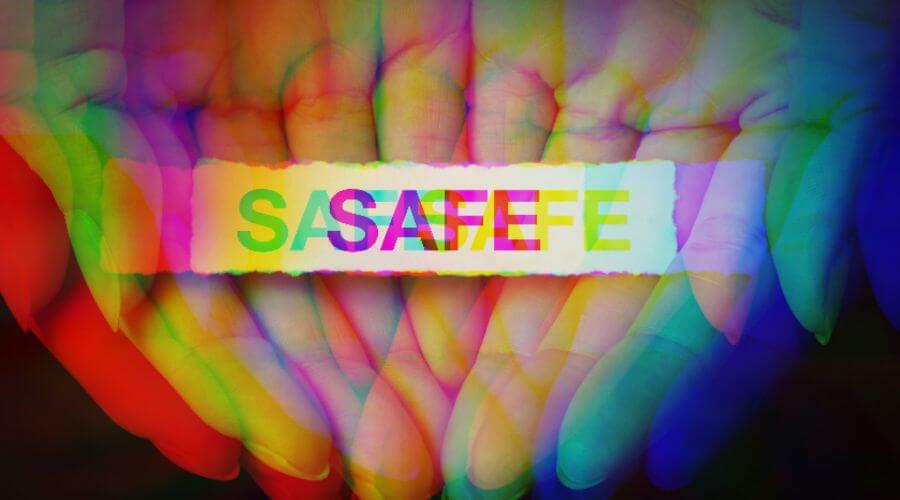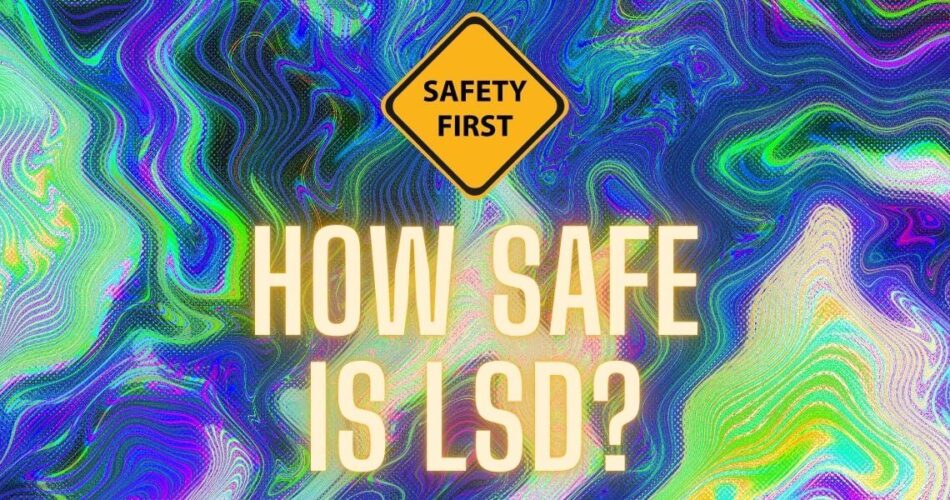LSD, or lysergic acid diethylamide, is a powerful hallucinogenic drug that has been used for various recreational, creative and spiritual activities. Its effects can vary greatly from person to person, and many people consider it a safe way to trip. But how safe is LSD? Read on to learn more.
TL;DR
- LSD (lysergic acid diethylamide) is a powerful hallucinogenic drug used for recreational, creative and spiritual activities.
- Effects of LSD can last 6–12 hours with peak intensity between two and four hours after ingestion.
- Common effects include altered sensory perception, heightened feelings of empathy and creativity, spiritual connection and enhanced mental clarity.
- Adverse effects include nausea, fever etc., while flashbacks may occur weeks or months later involving intense emotions/sensations as during the original experience.
- Drug addiction & abuse are possible due to its stimulant properties; long-term use may lead to mental health issues such as depression/anxiety/psychosis, but exact safety levels are unknown.
The Effects of LSD
Before we answer the question, “how safe is LSD?” let’s discuss the potential effects of taking LSD. The effects of LSD can last from 6 to 12 hours, with peak intensity occurring between two and four hours after ingestion of the psychedelic.
While the mental and physical effects may vary widely among individuals, some common experiences include altered sensory perception (distorted senses of time and reality etc.) heightened feelings of empathy and creativity, a deepened spiritual connection and enhanced mental clarity. Adverse effects include nausea, fever, elevated heart rate and blood pressure, confusion and anxiety.
Flashbacks are another potential risk of taking LSD, which is when an individual experiences a flashback from previous drug use. Flashbacks can occur weeks or even months later and involve the same intense emotions and sensations as during the original experience. So, how safe is LSD, and what is its potential for drug abuse?

Drug Addiction and Abuse
Because LSD is a powerful stimulant, users may develop drug tolerance quickly. Although LSD is not addictive compared to other substances, some users may find themselves craving the substance and developing a psychological dependence on it. Long-term use of LSD can cause serious mental health issues such as depression, anxiety, and psychosis. But exactly, how safe is LSD?
Editor’s Note
The exact safety levels of LSD cannot be known, as the effects vary from person to person. It is important to remember that any drug use carries inherent risks.
If you or someone you know is struggling with addiction, please reach out for help. There are resources available to support those struggling with substance abuse.
How Safe Is LSD?
Although LSD is generally considered to be a safe substance when taken in small doses, it can still have unpredictable effects. For example, some people may experience what is known as a “bad trip,” caused by hallucinogens, which is characterized by feelings of intense anxiety or paranoia. Long-term mental health risks associated with LSD use are still unknown, but research suggests that regular users may be more prone to mental health disorders such as depression, anxiety, and psychosis.
How Safe Is LSD? Conclusion
From day-glo visuals to an altered state of consciousness, LSD’s effects can be unpredictable. When used with caution – and only in small doses – it offers a curious exploration into the human mind; however such experimentation should always take place under the guidance of trained professionals for maximum safety.
Frequently Asked Questions
Is It Safe to Take LSD?
With its reputation as a relatively safe substance, the use of LSD is becoming increasingly popular. However, it’s important to remember that while generally low-risk, there are still dangers associated – particularly if users experience anxiety or paranoia during their trip and suffer from unexpected flashbacks afterwards. Taking care to ensure safety when using LSD should not be overlooked!
What Are the Potential Risks of Taking LSD?
While LSD can provide an altered experience, it is important to consider the potential perils before indulging. From anxiety and paranoia to flashbacks or even psychosis in extreme cases, one should be mindful of their environment when taking this psychedelic drug – as a safe setting may reduce your chances of encountering any adverse reactions.
What Are the Long-Term Effects of Taking LSD?
Although the full consequences of LSD use remain to be seen, research indicates that users may face a heightened chance for developing mental health issues. Therefore, if you’re considering taking this powerful psychedelic drug, it’s critical to weigh both its potential benefits and risks carefully before making an informed decision.
Similar Posts:
- How to Tell If Someone Is On LSD? Signs of LSD Abuse and LSD Addiction
- What Are the Effects of LSD? All About Lysergic Acid Diethylamide
- LSD Addiction Treatment Programs and Signs of LSD Abuse
- Does LSD Kill Brain Cells or Fry Your Brain? Long-Term Effects of LSD
- How Often Can You Do LSD? LSD Tolerance, Addiction, and Dose
- Facts About LSD: Everything You Need to Know About LSD
- PCP vs LSD: The Difference Between These Two Hallucinogens




